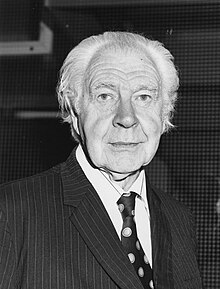Lionel Robbins
| The Lord Robbins | |
|---|---|

Robbins at the opening of the Lionel Robbins building, 27 July 1978
|
|
| Born |
22 November 1898 Sipson, Middlesex |
| Died | 15 May 1984 (aged 85) London |
| Nationality | British |
| Institution | London School of Economics |
| School or tradition |
Neoclassical economics |
| Alma mater | University College London, London School of Economics |
| Doctoral advisor |
Edwin Cannan |
| Doctoral students |
Nicholas Kaldor Amiya Kumar Dasgupta Abba P. Lerner William Baumol Frank Hahn |
| Influences | William Stanley Jevons, Philip Wicksteed, Léon Walras, Vilfredo Pareto, Eugen von Böhm-Bawerk, Friedrich von Wieser, Knut Wicksell, Alfred Marshall |
| Influenced | Charles Goodhart, John Hicks |
| Contributions | Robbins Report |
Lionel Charles Robbins, Baron Robbins, CH, CB, FBA (22 November 1898 – 15 May 1984) was a British economist and body of the economics department at the London School of Economics. He is known for his leadership at LSE, his proposed definition of economics, and for his instrumental efforts in shifting Anglo-Saxon economics from its Marshallian direction.
Robbins was born in Sipson, west of London, the son of Rowland Richard (1872–1960) and Rosa Marion Robbins (nee Harris). His father was a farmer and was also a member of Middlesex county council. Robbins' sister Caroline was a noted Professor of History.
Robbins was educated at the local grammar school, Southall county school. His university education began at University College London, but was interrupted by the First World War. He served in the Royal Field Artillery as an officer between 1916 and 1918, when he was wounded and returned home. He became interested in guild socialism and resumed his studies at the London School of Economics, where he studied with Harold Laski, Edwin Cannan and Hugh Dalton.
Robbins is famous for his definition of economics:
A follower of William Stanley Jevons and Philip Wicksteed, he was influenced by the Continental European economists: Léon Walras, Vilfredo Pareto, Eugen von Böhm-Bawerk, Friedrich von Wieser and Knut Wicksell. Robbins succeeded Allyn Young in the chair of the London School of Economics in 1929. Among his first appointments was Friedrich A. Hayek, who bred a new generation of English-speaking "continentals" such as John Hicks, Nicholas Kaldor, Abba Lerner and Tibor Scitovsky. Frank Knight was an American influence on Robbins.
...
Wikipedia
